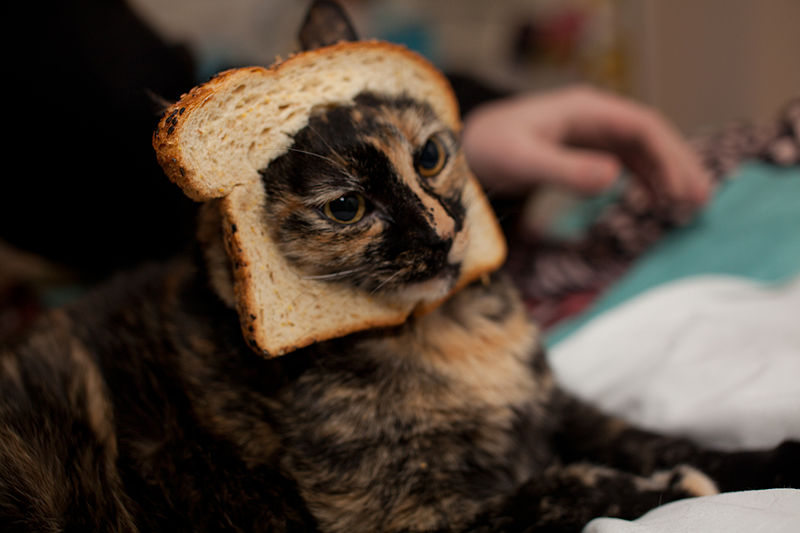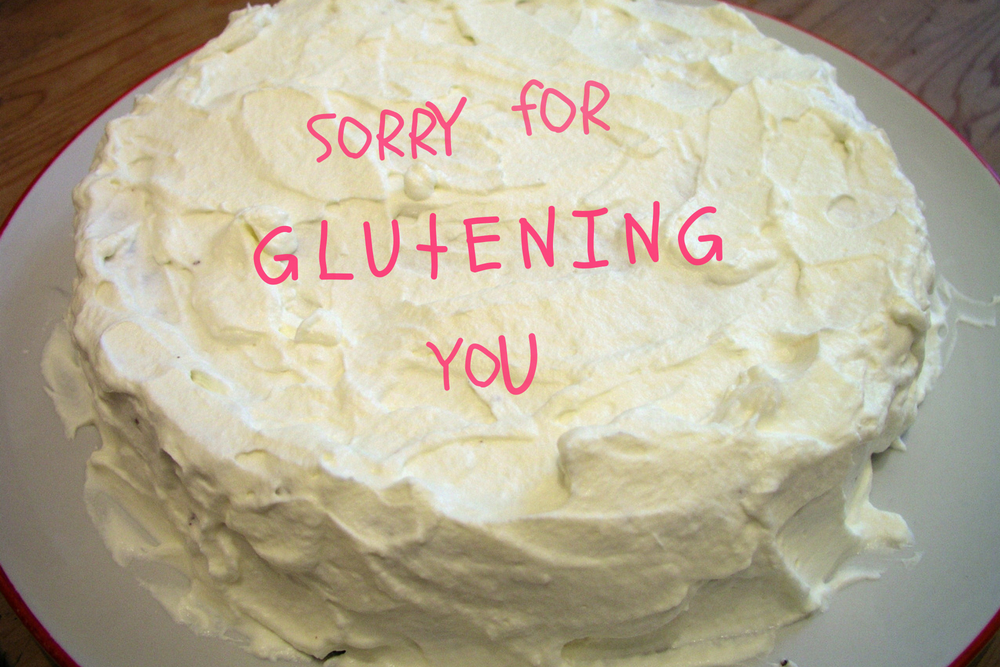A friendly FYI to the world, love from the coeliacs

Dear Gluten-Eaters of Planet Earth,
This week (May 14-20) is Coeliac Awareness Week. Which makes it the perfect time to indulge in a light-hearted open letter that scrupulously sums up how angry, exhausted, and ready to pack-up and eff-off to Gluten Free Island some of us are.
Gluten (the proteins found in wheat, rye and barley) is our sticky enemy and we kinda need you guys to help us out a little bit. This isn’t a noble mission to promote a ‘healthy’ gluten-free diet (we wish we weren’t lumped into that category of fad-eaters because this isn’t a choice). It’s just to clear up the murky, misunderstood world of coeliac disease, so that next time the gluten-dodger in your office seems ungrateful for the cake you baked them (“thank you so, so much, but I cannot eat it as you made it in your non-gluten-free kitchen and I may completely damage my small intestine if I risk it and probably increase the possibility of other random diseases and also get the shits non-stop for a week”), then you’ll get it.
FYI #1: Coeliac disease is not an allergy, it’s a lifelong autoimmune condition
For those who do not know what this weird vowel-heavy word means (and that’s okay, we didn’t either until we Googled it outside the GP post-diagnosis), coeliac disease is an autoimmune condition which makes our bodies attack themselves when gluten is eaten. It is not a food allergy.
The condition can be diagnosed with a tTG test, which checks the blood for exceedingly high levels of gluten antibodies, or an endoscopy (a tiny camera which goes down your throat and into your small intestine). The latter is the only way you can see if you have any villi left – those little hairy things in your small intestine that absorb the nutrients and vitamins you body needs to thrive. If you’re coeliac, they’re all gone.
A whopping 500,000 people in the UK are unknowingly living with coeliac disease. One in 100 people have been diagnosed. There are a whole myriad of symptoms which vary in each person: crapping yourself daily, brain fog, being tired AF all the time, looking eight months pregnant 24/7, regular cramping and pains, deficiencies in iron, vitamin B12 or folic acid, weight loss, vomiting, irritability, rashes… and that’s just a few of them.
So, yeah, this whole “gluten-free thing” isn’t just something Gwyneth Paltrow invented. Please take us seriously (and get tested if you’re concerned about symptoms).
FYI #2: Gluten-free does not mean coeliac-friendly
Now we’ve got the GCSE Bitesize biology out the way, you can kinda see why we’re not being Debbie Downers when we ask for our gluten-free pasta to be prepared separately and safely in a restaurant. Which leads to our biggest bugbear of all: cross-contamination when dining out.
Going gluten-free is good for business. If your restaurant’s rolling out the GF options, wheat-dodgers will drag Tinder dates there to avoid being stuck on the bowl all night instead of getting it on to a ‘90s slow jamz playlist on Spotify.
But despite ALL OF THE GLUTEN-FREE options, everywhere, coeliacs rarely have a stress-free dining experience. Before we even choose a place to eat, we have to contact the restaurant to make sure cross-contamination is controlled in the kitchen. This means separate prep areas for GF food, separate utensils, chefs washing hands before touching GF food and not cooking free-from food in the same oil as gluten. The phrases “it depends how sensitive you are” and “the oil is hot enough to kill the gluten” are horse-shit and we will immediately leave your restaurant if you tell us this. High temperatures cannot destroy gluten.
When we arrive, we have to do the whole charade again, because not every member of staff is knowledgeable on coeliac disease or responsive to our requests. The charity Coeliac UK are doing brilliant work to encourage restaurants to implement these guidelines and make places safe for coeliacs to eat without cross-contamination and stress. Personally, I think food places should not be allowed to offer GF options if they don’t prove it’s coeliac-accredited. If you’re a restaurant or cafe owner, for the love of god read their Gluten Freevolution guide and get your place accredited.
FYI #3: Sharing a kitchen is hell for us (please make it easier)
This one is to the gluten-eating housemates, family, friends, boyfriends, girlfriends, husbands, wives and co-workers of coeliacs. Sharing a kitchen with you guys is hard. And we don’t need you to be as obsessed with gluten as we are, but we do need you to be careful if you’re sharing a kitchen with us.
Sharing a food space requires patience, planning and (sometimes) passive aggressive Post-it notes. Let’s avoid the latter and clear everything up, right here, right now:
A coeliac’s shared kitchen rules
-
- Give us our space. We need our own gluten-free cupboard and segregated area to prepare our food – and we need all morsels of gluten to stay the heck out of them.
- Gluten is sticky. Please don’t use our designated gluten-free toaster, chopping boards, dish sponges, kitchen towels, pans, colanders, wooden spoons, forks, spatulas, rolling pins, whisks, or anything else we’ve segregated from the communal stuff.
- Thoroughly wipe down counters after preparing food on them. This isn’t just basic hygiene – getting rid of crumbs and sticky gluten residue could save us from losing a centimetre or two of villi.
- Don’t double-dip. Just like Joey, coeliacs DO NOT SHARE FOOD. Butter, jam, ketchup, mayo or any other condiments that we’ve separated and labelled as gluten-free are ours for a reason. Use your knife to spread gluten-free margarine on your gluten baguette and those crumbs are going to leave our small intestine in a right state.
- Let us know if you’re going to be baking. Airborne gluten is a thing and flour is extremely hard to contain. If we walk into the kitchen to knock up our dinner and you’re whipping up a batch of cupcakes like you’re in a bunting-clad tent with Paul Hollywood, we might get ill. We can’t stop you from baking but please clean up properly when you’re done, don’t touch our stuff and stay away from our ‘zones’.
- Please just tell us if you’ve used our stuff. People make mistakes and that’s fine – but if you’ve accidentally used our jam on your brioche, let us know it’s no longer safe. Better to ‘fess up than let us continue using it – a quick “omg soz I totally forgot and dipped my Doritos in your salsa” text is better than reducing our life expectancy.
Of course, not everyone needs to know this stuff. There are restaurants that rise above others and do the cross-contamination thing wonderfully. Waiting staff who will go above and beyond to ensure you’re safe, maintaining 100% communication with the kitchen staff at all times.
There are mates who won’t dunk their crisps into the dip until you’ve grabbed a dollop of it for yourself first. There are partners who will go brush their teeth after a beer, just so they can kiss you safely. There are parents who make it their mission to perfect the recipes their children once adored and are religiously strict with the cross-contamination thing when creating them.
There are sisters who will order the gluten-free bread starter, so you don’t have to fret over any crumbs on the table. There are brothers who will wash their hands after eating a sticky McDonald’s, so they don’t get the residue over the Sky remote and door handles that you touch every day. There are work pals who bring a box of Krispy Kremes for everyone, but still go out of their way to grab you a coeliac-safe brownie from M&S.
To all the non-coeliacs in our circle who help us out, understand, make us feel “normal”, share new gluten-free finds, check for cross-contamination procedures before booking a table somewhere, let us choose where to eat out, and ultimately, reduce our ever-rising anxiety levels on our lifelong quest to avoid the gluten that is everywhere and stay happy and healthy, we salute you.


Thank you for the terrific article
The other BALONEY about wheat being safe outside the USA is just some anti American propraganda. If that were true, onky the USA would have celiac disease, all races in the USA would suffer from Celiac. This is false. So the logic fails. Wheat is wheat.
By the way! The best essay writing service – https://www.easyessay.pro/